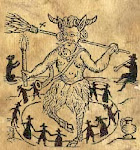
Teenage dabbling in witchcraft is something most of us would probably consider a harmless activity. Light some candles, burn some incense, pray to the Goddess. All in fun and games, unless you’re Willow Rosenburg.
I’m an avid Buffy the Vampire Slayer fan, and I’ve always thought of the case of Willow’s witchcraft to be a strange one. It started out fine; Willow was a more or less competent dabbler. The show never presented her fascination as bad or evil. Given the premise of the show, it would have been odd for them to do so.
Which leads me to season 6 of Buffy. Inexplicably, witchcraft became a bizarre metaphor for drug abuse and addiction. I consider it to be right up there among the worst misplaces drug allegories on TV.(anyone else remember “I’m so excited! I’m so excited! I’m so….. scared!”)
What makes this case all the more strange is that the show is basically putting witchcraft in a bad light. It makes it seem that practicing witchcraft is dangerous. Willow, probably the show’s sweetest character, is transformed into a crazy evil villain, bent on destroying the world.
Up until this point, the show had basically been promoting some forms of witchcraft. Willow’s magic managed to save the day using her powers. Now she’s addicted?
The witchcraft in Buffy had a clearly feminist bent. The show itself was bent on female empowerment. Witchcraft itself seems to be far more female friendly than other types of accepted religions. It prominently worships female deities as equal to, or even superior to, male deities. All this has made it an attractive alternative for some of the feminist movement.
Which makes this season 6 plotline more out of place. Not only does Willow go crazy, but it is only Xander, her male best friend, who can save them all. If you look at, it almost seems like an anti-feminist statement. Willow “overdoses” on empowering herself, and must be kept in check by the show’s resident man.
This scene is similar to the scene in The Craft when Fairuza Balk goes crazy on power. If the practice of witchcraft really does represent a kind of female empowerment, then what kinds of messages are we sending by showing these dabblers going crazy because of their dabblings? Are these movies really an invitation to witchcraft, or a slam against empowerment?
Perhaps I read too much into the situation, but it is something interesting to consider.

No comments:
Post a Comment